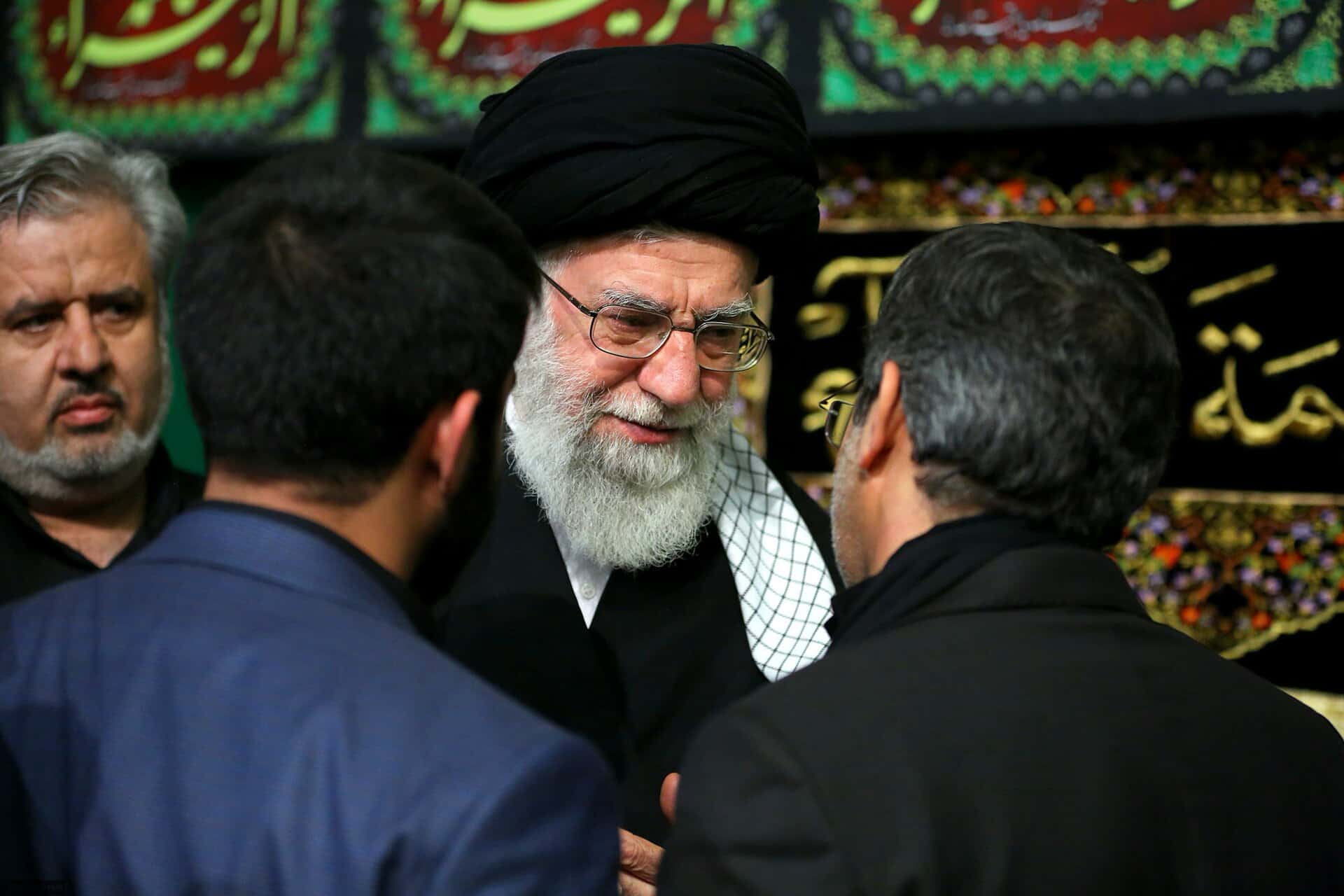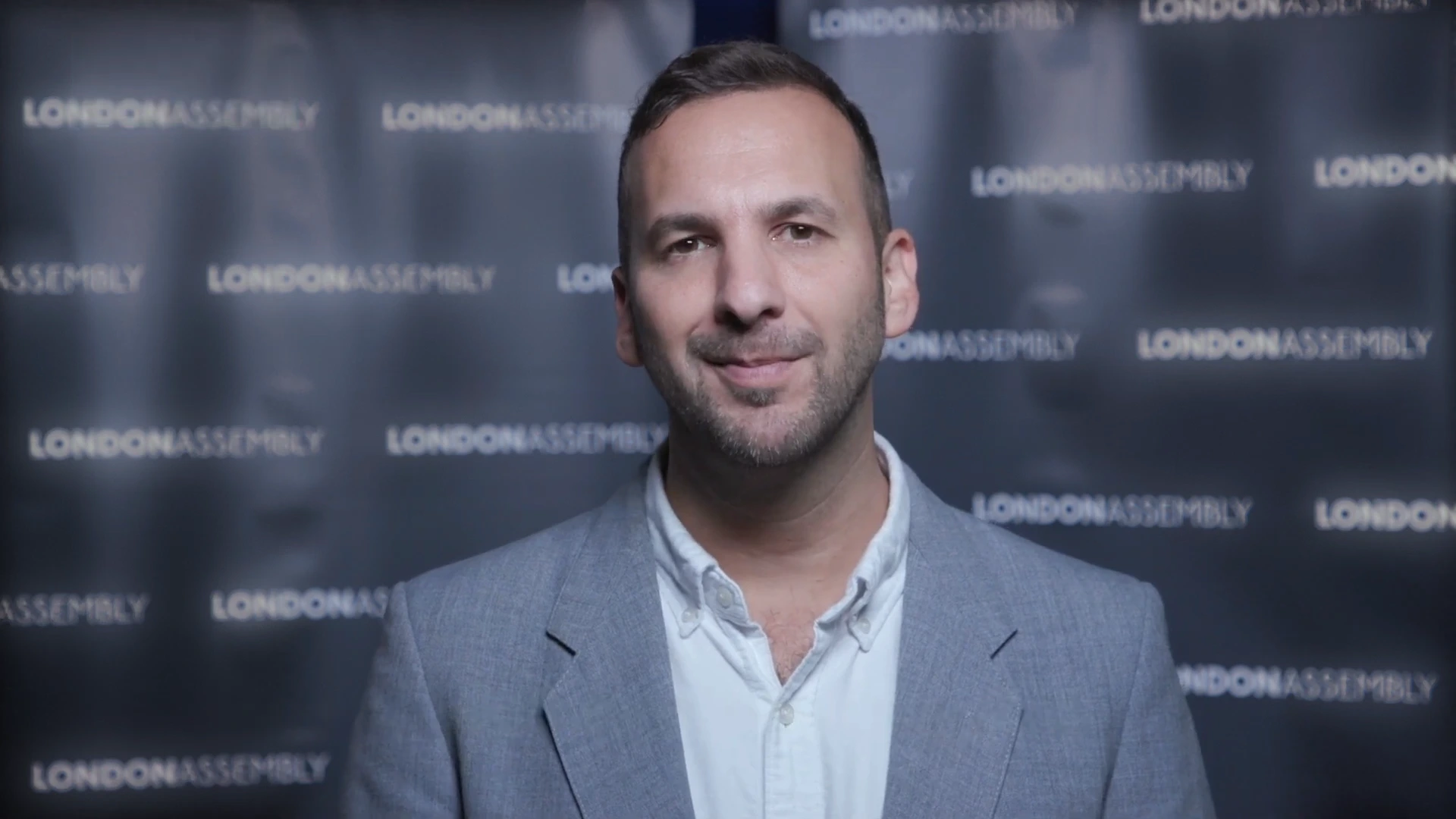Square Holes For Square Pegs: Revamping The Education System
Welcome this special issue of the Gordian Magazine. This issue offers the usual mix of politics and culture, with our main focus this time being on education. This issue contains many more exclusive reports, galleries and interviews by senior administrator, Ruby Goldenberg, our art editor, Carla Pietrobatistta, our puzzles creator, Katharina Wüstnienhaus, our interns, Jihane Al-assad and Kaitlyn Rivera and other UN-aligneders, namely, Usha Roopnarain, Cristina Mihailescu, Partho Pratim Chatterjee, Pradeep Kumar Chatterjee and Anahita Ahmadi. The editors are Adrian Liberto and Ariana Yekrangi.
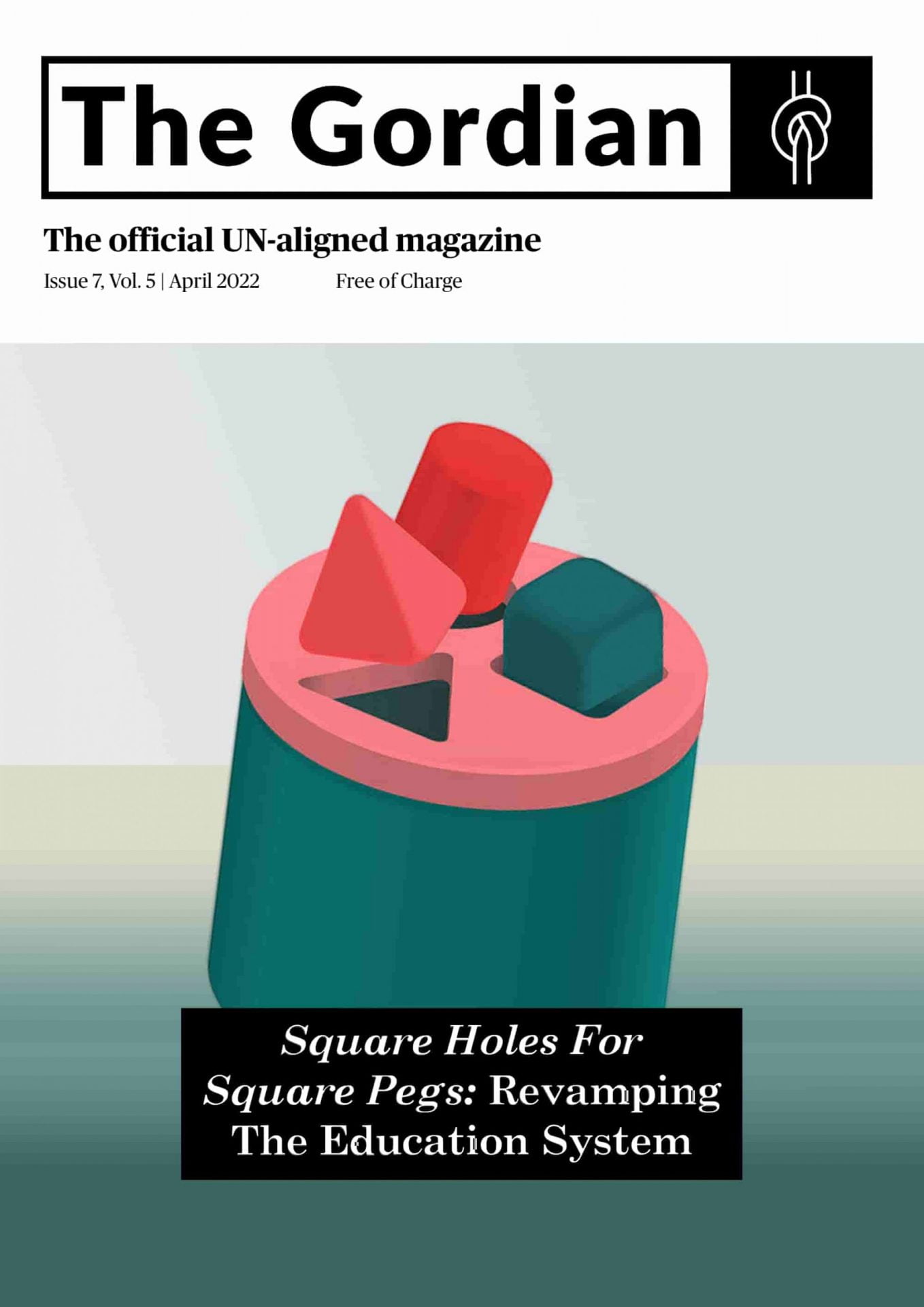
Letter from the Editors
Welcome to April’s issue of The Gordian! This issue offers the usual mix of politics and culture, with our main focus this time being on education.
Adrian Liberto’s article, Education’s Paradigm Shift, sets the scene with a revolutionary critique of traditional schooling and a vision of a more dynamic system for the future. Jihan Al-Assad’s article further highlights hurdles in education with a first-hand account of the specific problems Syrian refugee students face trying to learn in ill-equipped camps, where the situation has now been further exacerbated by the coronavirus. This article is complemented by another by Jihan that covers the hardships of refugee life in general. Our interview (Ruby Goldberg/Noor) also relates to education and describes the difficulties faced by pupils at the mercy of a system that is quite foreign to them.
Three articles touch on Russia’s brutal assault on Ukraine. Cristina Mihailescu, one of our new members from Romania, offers some insight into the influx of refugees pouring in from the war zones, while Adrian looks at the invasion form the point of view of appeasement, which he claims is far more endemic than just turning a blind eye to Putin’s previous atrocities. There is also an Open Letter to Putin, which of course he may never read, that calls him out for what he is: a barbaric killer.
The environment, of course, remains a hot topic and it is featured with two articles. Partho Pratim Chatterjee and Dr. Pradeep Kumar Chatterjee offer a brilliant look at technologies that can help tackle climate change, while our intern Kaitlyn Rivera looks at the problem in the context of climate refugees.
Art and literature merge in this edition, with Carla Pietobattista’s insightful article Rings in the Water, which explores the similarities between Dante (1265-1321) and Michelangelo (1475-1564). We are also presenting another poem by one of our poetry competition winners, Usha Roopnarain, titled This War of MMXXII.
The second quiz by Katha Wüstnienhaus is both amusing and engaging, as is our splendid Gallery by Anahita Ahmadi on the Maasai people in Kenya.
Finally, we present the usual news items you may have missed, which this month have also been supplemented with some interesting quotes relating to the war in Ukraine.
Exploring the difference between what is legal and what is ethical: The Gordian Magazine enters Vol. 6
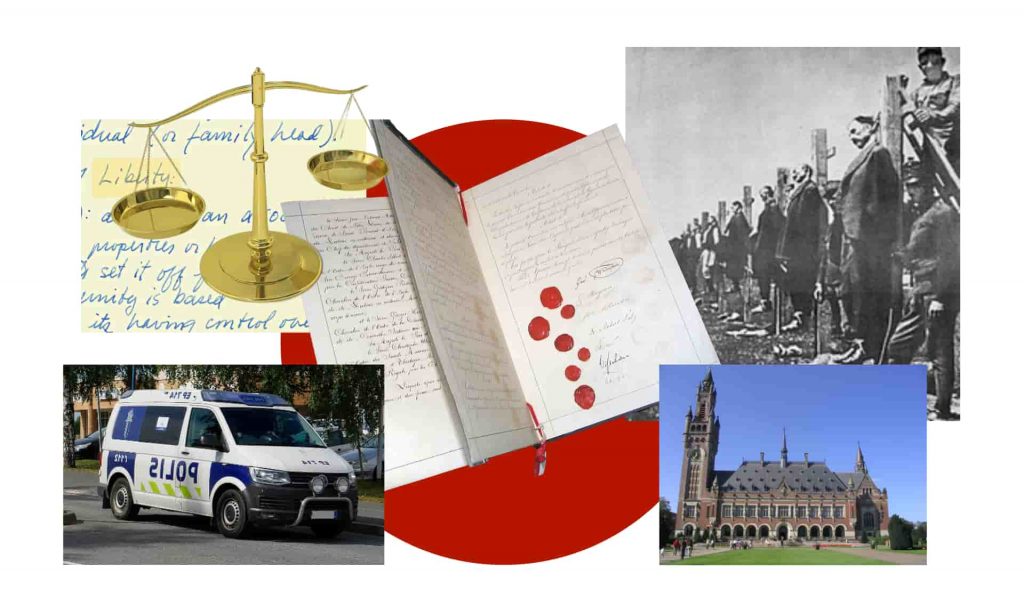
Photo by the UN-aligned design team.
Having covered social topics in the last few issues of The Gordian, in May we will be moving on to a series that will focus on law and order.
Topics will range from international law and treaties to general crime and punishment. We will also be exploring the difference between what is legal and what is ethical, which are two very different animals. After all, most of the world’s problems today are caused by activities that are more or less legal everywhere, such as intensive animal farming, extraction and consumption of fossil fuels, suppression of human rights and exploitation.
Read all previous issues of the last volume for free here.
If you have anything to say about this subject, please contact us. We would love to share your articles and stories or consider your suggestions for direct action to improve justice across the globe.
Education’s Paradigm Shift: “Another Brick in the Wall!”
By Adrian Liberto
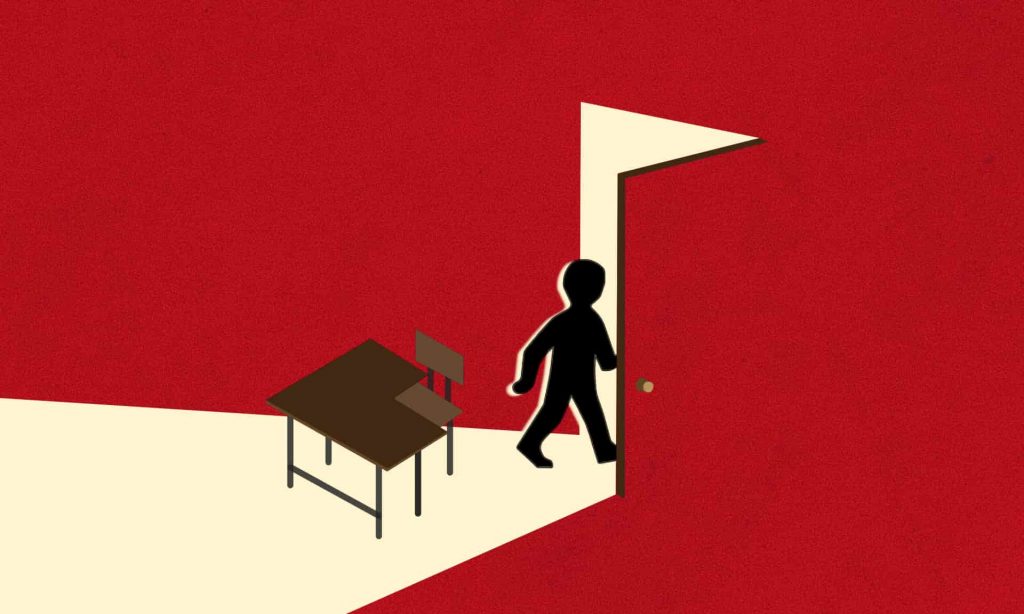
Photo by the UN-aligned design team.
A critique of traditional schooling and a vision of a more dynamic system for the future
As a child, one gets fed a lot of crap from one’s elders. Fortunately, not all of it is swallowed. “You’ll see! As you grow older, you’ll look back at your school days and you’ll remember them as the best days of your life!” Whether the many grownups who preached this believed it or not (it may have been true for some of them), I wonder how they could have possibly thought that these words could have been considered reassuring in any way. It is like telling a prisoner in a torture chamber: “You think this is bad, wait until they put you on the rack!”
My life has not been easy, by any standards, but my school days still stand out as a little hell on earth. I expect I am not alone in this assessment, although for some, school may be that one escape from an even more oppressive environment; or perhaps some students may just find the atmosphere at their schools friendly and inspiring. Still, this does not make traditional conveyor belt schooling systems good.
The curriculum, the resources and the methods are more often than not designed to churn out pawns that will fall into the various squares that society has prepared for them. Some may think themselves privileged enough to occupy positions that may be less restrictive: the bishops (educators, healers…), the knights (law enforcement, military…), the rooks (builders, entrepreneurs…), but ultimately it is all the same.
We are being processed primarily to fill in roles within society: the supply that will meet the demand. Sure, schooling needs to provide some of that, but not only does our current system focus solely on that, it often does so to the detriment of a holistic education that will bring the best out of every student. In fact, as Carl Sagan make clear in this little clip, schooling generally snuffs the spark out of us:
https://www.youtube.com/watch?v=acBRahW5c-A&list=PLl1nqjm6XTkx6gd-v1m1DvcaT9HeYcFae
Some of the reasons why I hated school so much were personal ones. I was slow, I was a foreigner, I was sensitive… Nevertheless, in a decent schooling system, these peculiarities should not matter, because a good education should exploit every ounce of individuality as part of the didactic process.
Alternative schooling
Technology has brought significant changes to traditional schooling; on the one hand because students are learning about it and on the other because it has provided opportunities and resources that did not exist before. Apart from this, however, teaching methods and educational curricula have evolved ever so slowly, and rarely with the courage needed to dramatically reform the system for the better.
Home schooling has always provided a certain freedom that has offered wider opportunities, but the success or failure of this method is very much at the mercy of the mentality of the parents who are offering it.
Apprenticeships have also proved quite liberating. One would think that whilst unbound in one respect, apprenticeships are nevertheless quite limited regarding range on the other. Again, this would depend on the approach of those offering it.
The education of Renaissance artists, for instance, often depended on apprenticeships with established masters, and whilst these produced outstanding artists like Leonardo da Vinci and Michelangelo on the one hand, on the other, these very artists were polymaths par excellence.
The Renaissance man and to a certain extent woman, in fact, who relied extensively on mentors, is almost synonymous with polymath.
More recently, alternative schools have been attempted with varying degrees of success. The early 20th century saw a number of these schools emerge in the West, inspired by educationalists like John Dewey and Maria Montessori. In Europe, for instance, Paul and Edith (Cassirer) Geheeb, founded the Odenwaldschule (1910 – 2015) in Germany, which offered students a high level of independence and flexibility. Also in Germany, A. S. Neill founded a similar school in 1921.
The school moved to England in 1924 and is still thriving today as the Summerhill School. It prides itself on its “free-range” environment that sets out “to make a school that would fit the child rather than forcing pupils to do what parents and educators thought might be best for them.” In 1927, philosopher Bertrand Russell and his wife Dora founded the innovative Beacon Hill School in England, which focused on learning through activities. The school, which was primarily Dora’s concern, was hounded by authorities and financial problems and eventually closed down in 1943.
A renewed interest developed in the 1960s, particularly with the Free School Movement in the US, but this soon declined with President Nixon’s conservative policies of the 1970s.
The problem with alternative schooling
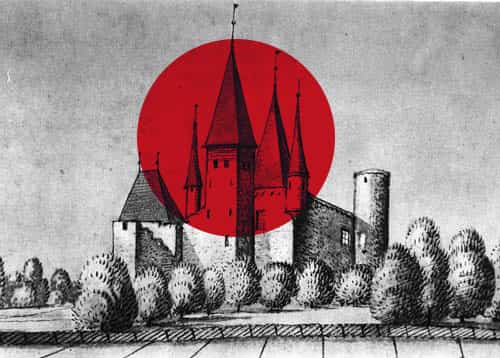
The Le Rosey institute aims explore the talent in each individual student. This of course comes at the shy price of $130,000 per year.
Despite being on the right track, the problem with these progressive schools is that they operate in a bubble, which can leave students at odds with the mechanisms of the “real” world they are then obliged to interact with. Also, being private enterprises, these schools can prove to be expensive to run and therefore expensive to attend.
What is needed in order to achieve the best results, is an overhaul of the whole education system that would make all schools progressive while integrating them with national education systems.
Apart from flexibility and more autonomy, which are already being asserted, these progressive schools need a meaningful curriculum that reflects the changing world we are living in today. Moreover, we must get rid of the dead wood; this should include classrooms, rigid age discrimination and exams.
These proposals may sound outrageous, but perhaps close look may show that they are not as fantastical as they seem.
How to create a meaningful curriculum
Let us look at the compulsory subjects in the British National Curriculum, for instance, they consist of: Mathematics, English, Science, Design and Technology, History, Geography, Art and Design, Music, Physical Education, Computing and Ancient and Modern Foreign languages.
These subjects seem useful enough, but if we examine the actual syllabuses of each, we will see that there is much to be done.
Let us take Mathematics for instance. I expect we would all agree it should be there, but the syllabus is another matter altogether. How many of us really care or need to know at what point a train travelling at a certain speed and having left at a certain time will intersect with another train travelling at a different speed having left at a different time, after both trains had certain Herculean labours to overcome in the meantime?
Do we really need to torture children with problems of this sort or with calculus, trigonometry and complex algebra?
Once we have learned how to add, subtract, multiply and divide, as well as how to work out simple percentages, we would probably have acquired all the maths necessary for most professions and our day-to-day life. If one is mathematically inclined, or wishes to choose a career that would require a more detailed mathematical knowledge, all well and good: the option should be there, but imposing it on children who have no love or talent for it is nothing short of barbaric.
Brain Teasers, on the other hand, can be fun and they can help children develop their problem-solving skills more creatively, as can basic algebra and basic geometry.
What is missing from the curriculum: However, what is equally problematic with the above curriculum is what is not on the list: Citizenship, Human Rights, Environmental Protection, Self-care, Cooking, Government (including taxes and the legal system), Budgeting, Film Appreciation, Driving, Job Hunting (and work skills, like teamwork and punctuality) …
These subjects are more likely to impact our lives and the lives of others than knowing what turns litmus paper blue or red, and yet we pass over them glibly.
It is all well and good to learn about the Black Death, but when our pandemic came along many people ended up behaving like idiots, simply because they just did not have a clue on how to act in real life situations.
No Classrooms! But what instead?
Let’s make schools theme parks for learning
Ideally, I would have opted for abolishing schools altogether, but they would have to be replaced by a range of easily accessible community facilities that would establish educational spaces in a whole range of public and private concerns: museums, hospitals, police stations, train stations, libraries, factories, government buildings, science labs, conservatories, observatories, farms, offices and so on.
Apart from the space and facilities, the mechanisms would also need to be in place so that children could learn without jeopardising respective operations. The teacher would become the conductor and the whole of society the performers. One could look at it as an unlimited apprenticeship scheme, subsidised by taxes, or rather a reduction of them. Such a scenario would take time and vision to materialise however, therefore, abolishing classrooms would seem like a good first step.
So schools can stay for now, but classrooms should go. In this scenario, schools would need be converted into learning spaces with science labs, mini-museums, theatres, art studios, music rooms, calligraphy rooms, reading rooms, gyms, computer labs, virtual travel arenas - as much like a holodeck as possible, supported by tour guides (history and geography teachers), games rooms (which would include a range of mathematical learning tools and challenges), language labs, kitchens, cafes, greenhouses and allotments.
Various artists, artistic enterprises and small businesses could be offered space within these buildings subject to an agreement that they would offer tutoring services that would be audited for quality assurance purposes.
In these revolutionary spaces, the closest thing to traditional classrooms will be conference rooms for various kinds of workshops. In other words, schools would become theme parks for learning.
No rigid age discrimination
As students develop, so will their interests and one of the main challenges will be to stimulate and educate children taking into account their different stages and abilities.
Learning how to read and write, for instance, will have to take place early on in a child’s education, while something like driving and work skills would be more appropriate for older children. Nevertheless, the system that mainly operates at present, where children are herded into classrooms strictly according to their age is solely of benefit to the institution, never to the pupil.
Student A may be several years ahead in music and a few years back in science: so be it!
Some children develop faster than other children and they may develop some subjects faster than other subjects. They should not be held back for the sake of the institution. This would require ongoing assessment and timely and coordinated booking of facilities. Periods should also take into account children’s limited attention span and though roll-on roll-off lessons would require too many staffing resources to be feasible, shorter lessons should be considered where appropriate.
Nevertheless, much of the learning will be self-managed and therefore these study periods could be self-regulated. The main point here is that age should never be a barrier to learning and progress.
No exams
If you have stuck with me so far, you will probably be wondering how such an individualised education could possibly be effectively assessed. The answer is simple: through portfolios. Every so often, children would have to present their portfolios which will evidence what they have done for that period. There would be a credit system and clear instructions on what would constitute evidence for each subject. The system would not be that different from the National Vocational Qualifications (NVQs) that provide work-based learning qualifications in England.
There will be a quota of credits for limited mandatory subjects as well as quotas for optional ones. Subject selection can be linked with university entry requirements or specific professions that students can progress to directly.
By the end of one’s schooling, a student should have attained the required number of credits. Flexibility regarding the duration of one’s schooling therefore should also be considered: for instance, finishing two years before or two years after the standard time. Apart for being a fairer and more accurate method of assessing a student, the tyranny of examinations that have led children to suicide and breakdowns will be terminated. By allowing for more flexible school days and times as well, the drudgery of homework could also be eliminated. Of course, the devil is in the detail and there is no time for that in this short article, nevertheless, just as work-based learning has proved effective with the NVQ framework, so should a parallel school-based system work, given the proper thought, funding and support.
Making it happen and making it work
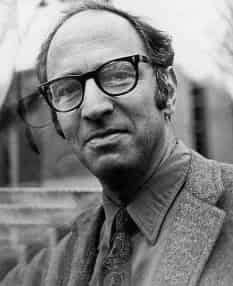
Thomas Kuhn
American philosopher of science, Thomas Kuhn, had coined the term paradigm shift in his 1962 book The Structures of Scientific Revolutions to highlight the difference between “normal science” and revolutionary science, which often needs a generation in order to become accepted and take root. According to Robert Anton Wilson, when it comes to politics, religion and economics:
“Time-lags of centuries, or even millenniums, are common there.”
When it comes to education, we have waited millennia already. This paradigm shift is needed now. Technology has taught us how to run before we properly learned how to walk. This is dangerous, partly because of the war games that are being played out on the world stage, and, perhaps more crucially, because the world is going up in flames while we fiddle in a semi-stupor.
Money is not the problem. If we look at the budgets of developed countries, education is up there at the top with health and defence; and a progressive system of education as the one described above should not cost that much more than the current flawed one, especially once the necessary facilities are put into place. Moreover, making credits available from the private and public sector from the start could reduce costs. Students could also be registered with more than one school, so that neighbouring schools could specialise in specific subjects so that state of the art equipment would not need to be duplicated. The system itself could also work well in poorer countries, even though the resources necessary to maximise efficiency may take longer to materialise. Making use of the public and private sectors here would therefore be particularly helpful.
There is so much more to say about education and so much detail I have had to omit regarding the above proposals, but I think that I have said enough to introduce the idea of a paradigm shift in the way education is provided.
Significant change for the better, however, will not happen by voting for the same old idiots. Now is the time to be more courageous. Now is the time to help UN-aligned push for better institutions. Be part of that change by supporting us.
Education of Syrian Refugees During the Coronavirus Pandemic
By Jihane Al-assad
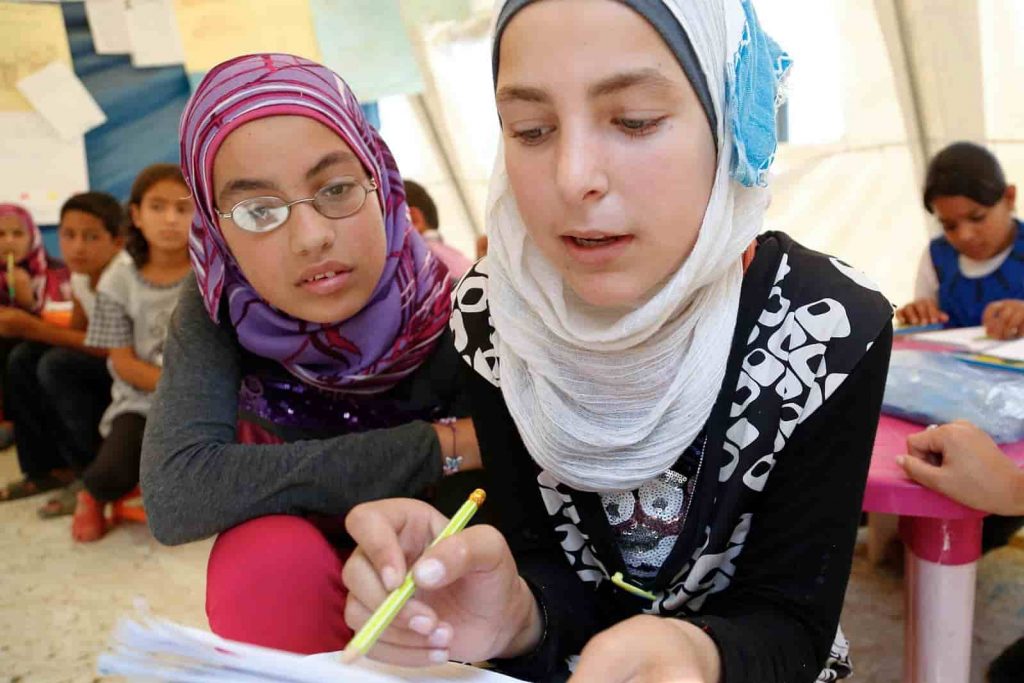
Alia and Basma, both aged 12, tackle a maths question at a temporary school in northern Lebanon. Photo: DFID
Once again, refugees in Lebanon find themselves vulnerable to discrimination as thousands of pupils are forced to leave their school seats
Prior to the epidemic, the refugee child was twice as likely to leave school as a non-refugee child. In Lebanon, poverty-related changes have been driven largely by inflation and poverty has increased by about 33 percentage points among the Lebanese population; the increase among Syrian refugees here, however, has increased by 55 percent.
Children have not been able to continue their studies because of closures, but they are also constrained by a lack of educational opportunities at home and the digital divide.
Thousands of Syrian refugee children are out of school because of policies requiring certified educational records, legal residency in Lebanon, and other official documents that most Syrians cannot obtain.
Because of the Corona pandemic, children’s education headquarters in camps for displaced persons in northern Syria have been closed with measures to prevent the coronavirus from spreading.
In Lebanon, internet communications networks and infrastructure still do not meet the needs of many rural areas, where poor internet connectivity leads to barriers to distance learning. Syrian refugees face this problem coupled with a lack of equipment because of poverty. This currently deprives many refugee children of education.
Like many countries, following the outbreak in winter 2020, Lebanon imposed a total closure of schools, forcing children, including Syrian and Palestinian refugees, to stay home and learn remotely online. However, such actions have not gone smoothly in a country experiencing rapid economic collapse, and the poorest and most vulnerable classes, were hit particularly badly. The basic components of distance learning, the simplest of which are ensuring computers and the Internet, are not accessible in a refugee camp. In addition to the absence of computers, often the entire family will have to rely on just one smartphone.
The continuing financial collapse has deepened the onset of poverty, with more than half of Lebanese below the poverty line, while the rate rose to 70 percent among Palestinian and Syrian refugees.
The dire consequences of this situation are thousands of Syrian children in the camps forced to leave their school seats. As stated above, the pandemic has also aggravated the state of affairs for those organisations that were there to help.
These are just some of the obstacles to education Syrian children in Lebanon are facing.
“Life was not good before the COVID-19 outbreak, but now it is much worse and everything is 10 times more expensive.”
- Diaries from Refugee Camps is a series that gives readers a glimpse inside the challenging life of refugees. Are you a refugee and would like to share your story inside this series? Please write to us.
“I couldn’t understand a word of it, but I loved choir singing” - My life as a Moroccan child immigrant in 70s England
As told to Ruby Goldenberg
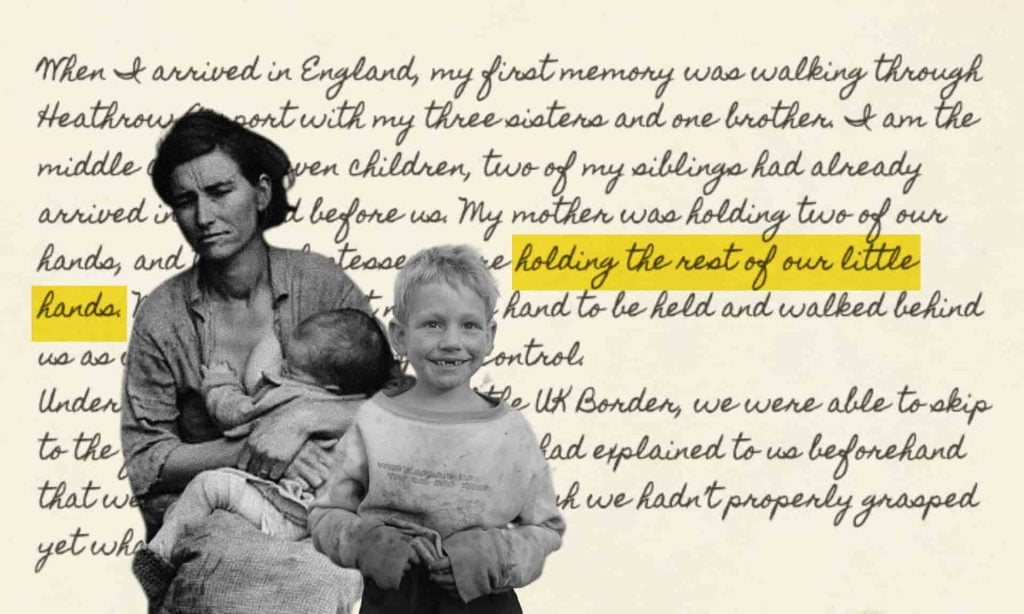
Photo by the UN-aligned design team.
Noor shares her experience as an immigrant child who came to England in the 70s from Morocco. At the time, she didn’t speak a word of English and was thrust into the British Primary School education system. This article contains strong language.
4th October 1974
When I arrived in England, my first memory was walking through Heathrow Airport with my three sisters and one brother. I am the middle child of seven children, two of my siblings had already arrived in England before us. My mother was holding two of our hands, and the air hostesses were holding the rest of our little hands. My brother didn’t need his hand to be held and walked behind us as we approached Passport Control.
Under the fluorescent lights of the UK Border, we were able to skip to the front of the queue. Our mum had explained to us beforehand that we were coming to London, though we hadn’t properly grasped yet what that might be like.
I looked around with feelings of excitement and I remember saying “I think that this is London.” My brother said “No, we’re not there yet.”
After arriving, we had to take the London tube to where we would stay for the night. It was such a strange sensation to be sat on a train that was travelling underground. We moved through an endless black tunnel snaking under London. The upholstery on the tube seats was worn and faded from thousands of passengers sitting before us. My nose was full of the smell of oil and brake pads, the air was nauseating, hot and stuffy. The noise of the tube as it rattled through the stations was a high pitched dragging of metal.
We settled into a Victorian flat in Elephant and Castle in London. I was placed into a Catholic school with a purple school uniform. I’d sit in the classroom in total silence. The chatter was unintelligible babble to me, I couldn’t make sense of what was being said and was isolated in this strange, noisy world.
I’d just sit and pray for Allah to please forgive me
As with most schools, we had regular assemblies which would take place in a Church. An enormous crucifix hung before us at the front of the assembly and the entire time I’d just sit and pray for Allah to please forgive me for being there, and insisting that I was not worshipping the cross.
Just existing around Catholic imagery aged 8 years old made me feel as though I was a dreadful sinner. My father back in Morocco was very religious, and that had rubbed off on me.
I remember break times, running around in the playground at school. In fact I remember being chased, or rather hounded by one girl in particular who alongside the chasing would spend her break time calling me a “Dirty Arab.”
Lunchtimes at this school were very peculiar for me, as with school dinners across the country, I’d have a choice of what to eat. Every week I’d manage to choose a dish with pork in it, and as I sat down to eat the teacher would approach me shouting “Pork! Pork!” and swiftly swap my plate for something else.
One thing that I enjoyed at school however was choir singing. I didn’t understand what I was singing about. I would just practice replicating the sounds of the words and singing them to the tune. Except for that, I existed in survival mode, just trying to get through each day.
Outside of these necessary interactions at school I never conversed freely, I wasn’t able to make friends. There was so much going on inside my head, but I simply didn’t have the language nor the confidence to articulate myself. I was surrounded almost entirely by white British children at school whom I couldn’t make friends with. I may have had plenty of exposure to English, but hardly any real life practice.
The groundwork for my education happened after the school day. My siblings and I would come home and practise what we had learnt at home together, all the while practising how to speak English with each other. Infact, it felt as though most of my learning happened at home, in those hours after school with my siblings. We’d be rather excitable and enthusiastic about our practice and drilling in the necessary curriculum. But then in the morning I would get to school and be almost completely mute.
We left Elephant and Castle in 1976, I was aged 11 at the time and still very much finding my feet, but was about to face my first day at secondary school.
- This is part one out of three from the “At school in 70s England” series.
- For privacy reasons, the interviewee has chosen to use the alias Noor.
Policy Making: How to Achieve Net Zero
By Partho Pratim Chatterjee & Pradeep Kumar Chatterjee
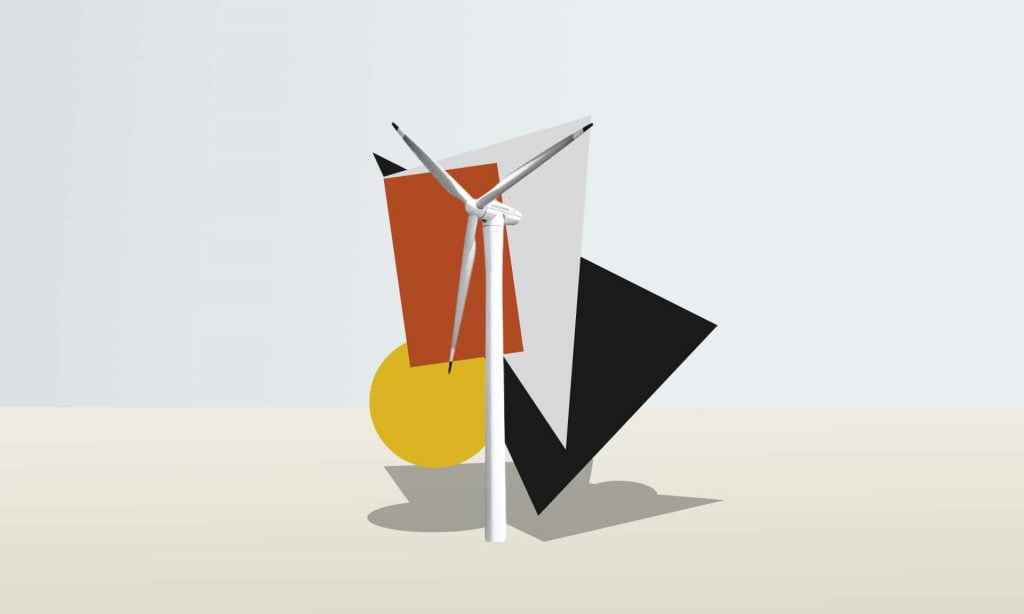
Photo by the UN-aligned design team.
The Clean Energy Imperative
Clean energy sources like solar, wind, hydropower and nuclear energy have low Levelized Cost of Electricity (LCOE). This makes electricity purchase from clean energy sources more economically viable and environmentally sustainable for domestic as well as commercial applications. Therefore, increasing the share of clean energy sources in the energy generation mix is essentially advisable. Historically, developing nations have been dependent upon fossil fuel based power generation at large to meet their primary energy requirements.
This indeed is an environmentally pernicious way of power generation. Apart from the plethora of deleterious effects of their exhausts on pulmonary health, their use exacerbates global warming. With this backdrop, the article dwells upon exploring the various policy interventions required to usher a clean power generation based net zero economy. These novel changes could help achieve the goals of the Paris Climate Agreement in letter and spirit.
A Planned Approach
Energy generation from decentralised and clean energy sources augments energy security compared to a centralised power generation source that primarily offers succour against blackouts and brownouts. As electricity is one of the prime movers of the economy, a low per unit electricity tariff decreases the production cost of goods/services, making it more affordable to the end user/ultimate consumer. This in turn augments their sale, promotes backward as well as forward integration and increases the per capita income of the economy resulting in a multiplier effect.
Therefore, it is imperative for the state to increase the adoption of clean energy sources via apposite policy interventions. In power generation, land acquisition has proved to be a severe challenge in setting up of power plants. It is a well known fact that in countries with low per capita income, people refrain from making upfront capital expenditure. In this scenario, an ingenious approach needs to be pursued to facilitate the adoption of clean energy sources in the economy.
In this approach, the local people can allow energy generation companies to install solar photovoltaic panels on their rooftops or on pillars over their landholdings (to optimise land use). The net power generated (Power Generated- Power Consumed) by each household can be sold to the generation companies at reasonable rates. This creates a symbiotic win-win situation for both stakeholders i.e. community members and the energy generation companies.
The energy generation companies do not have to either procure the land or take land on lease whereas the community members do not have to incur Capital Expenditure (CAPEX) and Operational Expenditure (OPEX). It may result in the community members’ transition from mere “Consumers” to “ Prosumers”, as well as generating socio-economic benefits. Similarly, efforts should be made by the state to mandate the use of net metering and smart meters. This will accelerate the pace of installation of solar panels in households and landholdings. Consequently, floating solar photovoltaics could be installed in lakes to extirpate land acquisition hassles.
Further, policy to meet Nationally Determined Contributions should be flexible enough to allow individual states to choose how to fulfil their Clean Power Obligations (CPO). For countries with diverse geographical and geo-physical conditions, priorities may vary. States or regions having substantial areas consisting of deserts and receiving high solar irradiation may meet a sizable percentage of their CPO through solar power. On the other hand, littoral states may largely opt for wind power to meet their CPOs, while mineral rich states in the hinterland, having substantial uranium reserves, may opt for nuclear power post fissile Uranium-235 enrichment to fulfil their CPOs.
It is imperative to introduce merit order based dispatch to make the adoption of low carbon sources ubiquitous. This will ensure that the generators dispatch power in increasing order of LCOE. Nuclear Power and Hydropower are the essential backbones of any clean and robust energy mix. This is because these generation units offer high grid inertia due to the presence of rotating parts.
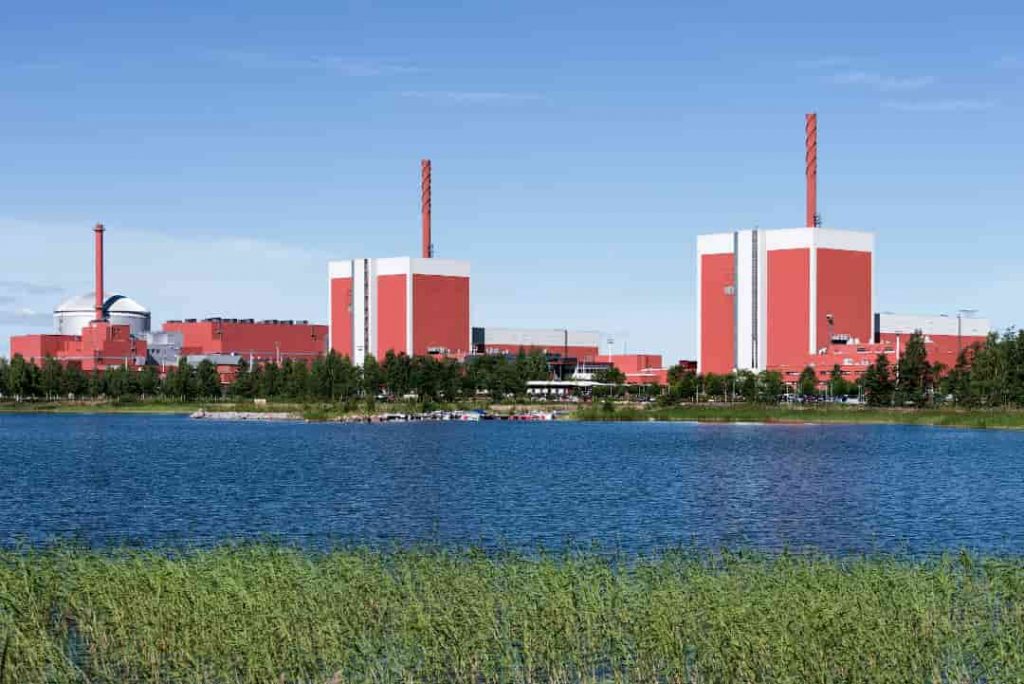
Olkiluoto Nuclear Power Plant in Eurajoki, Finland
Further, nuclear power plants have a very high capacity utilisation factor and can be used to provide stable base load power if the intermittent wind and solar generators are not available as required due to unfavourable climatic conditions. Hydropower has the extraordinary ability of adjusting supply in response to demand in a very short time and is a vital prop for frequency/active power stabilisation.
Production Linked Incentives (PLIs) should be provided to ensure that Solar, Wind, Hydropower and Nuclear Power can be used to diversify the production of clean hydrogen via electrolysis of water in addition to electricity generation. Hydrogen can be used as clean fuel in high temperature industrial applications and Fuel Cell Electric Vehicles. Clean Hydrogen is also an important stanchion for sustainable long term storage and should be promoted by using lower taxation rates than fossil fuels like methane, propane, petrol, kerosene and diesel.
The installation of Flue Gas Desulphurization, Selective Catalytic Reduction, Electro Static Precipitator and Carbon Capture & Storage mechanisms should be mandated in coal based power plants. Subsidies and PLIs should be provided to convert them to nuclear power plants as steam turbines need not be installed separately. These inept and jaded high carbon units can also avoid the incorporation of the above mentioned cost intensive sequestration technologies.
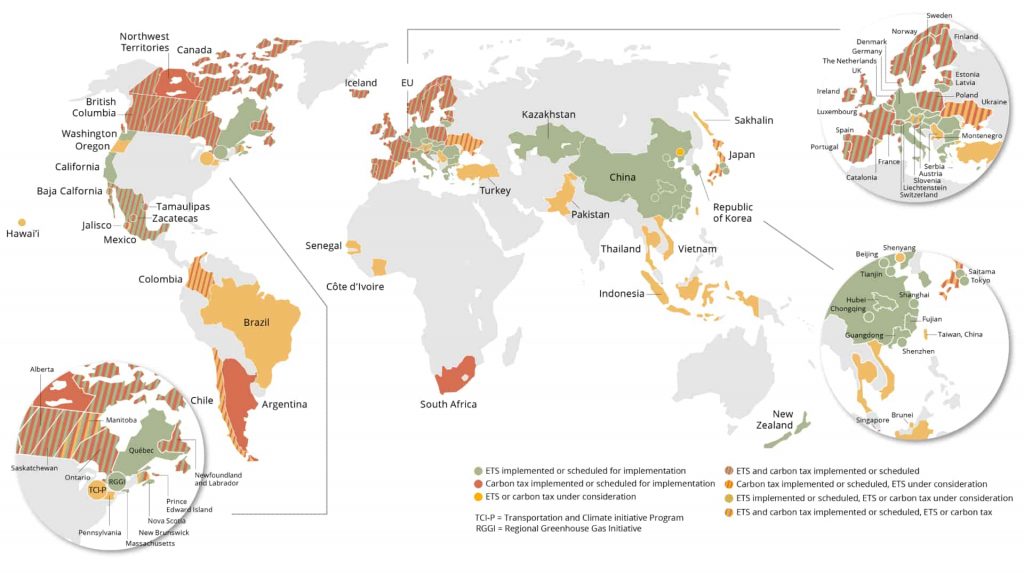
Emissions trading and carbon taxes around the world (2021) © World Bank
Incentives
Introducing variable Time of the Day tariffs for households by the state could trigger demand response. This means that people perform their energy intensive household chores at those times when cheap power is available from low LCOE clean energy sources. This will promote the adoption of clean power sources by the people.
Implementing a Carbon Tax would be fiscally advantageous for developing countries, as Carbon Tax pays a double dividend. It helps in generating revenue for the state in addition to discouraging carbon dioxide emissions. It also increases the OPEX of gas and coal power plants and lowers their position in the merit order compared to low carbon sources.
Governments in developing countries also have to earn revenue apart from curtailing emissions. Carbon taxes can generate the necessary revenue for the government. It can then transfer the money to the accounts of the poorer sections of the population via Direct Benefit Transfer (DBT) Mechanisms (ousting corruption and ensuring higher percolation rates to the desired clusters) linked with a unique National Identity card. This could be a great step towards the redistribution of income in countries rife with economic inequalities. The DBT mechanism ensures that the low income group have higher disposable income which enhances social acceptance of the state policy. Carbon tax’s implementation is not complex. It also promotes technological innovation and Research & Development in the field of emission sequestration technologies.
It is our firm conviction that the above mentioned novel policy interventions could help achieve a net zero economy powered by the 4Ds, Decarbonization, Decentralisation, Digitalization and Democratisation.
Climate refugees in the modern world
By Kaitlyn Rivera
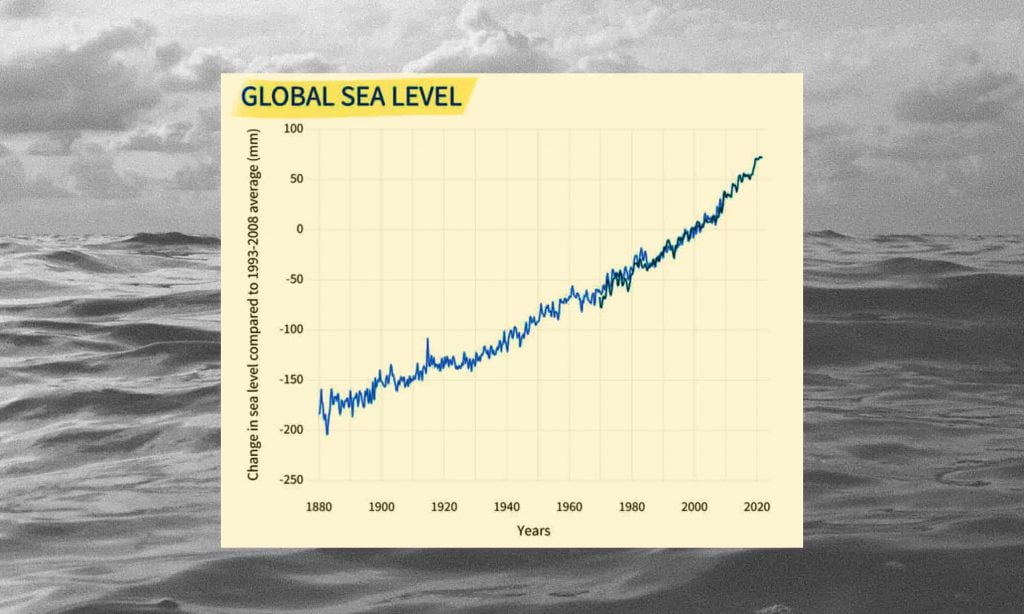
Photo by the UN-aligned design team.
By the year 2050, more than 200 million people will become classified as climate refugees. Climate change has accelerated the rates of human migration, and this effect will continue to intensify.
A climate refugee is someone displaced from their home because of an extreme weather event caused by climate change. This particular category of refugees is coming from all over the world to various places that are not being affected as deeply by extreme weather.
Climate change is nothing new and neither is human migration. Migration has been a huge factor in international interactions since the dawn of written history.
Global climate change however, is a relatively recent occurrence. Climate change is defined as “the increasing changes in the measures of climate over a long period of time – including precipitation, temperature, and wind patterns”.
Worldwide climate change has an impact on human migration in many ways; in 2020, over 30 million people worldwide will have been displaced due to some type of extreme weather event. These detrimental weather events are occurring all over the world with more frequency each month. Extreme weather can often lead to other issues as well, these issues can include but are not limited to: famine, drought, volcanic activity, earthquakes, etc.
The connection between climate change and human migration has been analyzed by the United Nations, and goals have been put in place to help alleviate the damage caused by the human impact on the environment.
Unfortunately, these goals are rarely, if ever, accepted by a majority of countries; national and international governing bodies have a responsibility to protect and support their people, but people being affected by massive climate events are often overlooked.
Currently, there are over 84 million people worldwide who have been displaced due to some type of climate event. Most of the refugees are people being displaced within their own country, but about a quarter of those people are crossing international borders to escape the climate disasters.
Climate change seems like an unstoppable giant, but as nations and as individuals, we have the power to slow down extreme weather events and natural disasters that have caused this new wave of human migration.
What has been done so far and what can we do better
Countries across the world have undertaken multiple efforts to combat climate change, these efforts include: the Intergovernmental Panel on Climate Change, the Kyoto Protocol (1997) and the Paris Accords (2015). Combating the climate problem is something that requires an international, cooperative effort; when countries (especially the wealthier countries) band together to support the cause, there is more room for accomplishment; more often than not, smaller, less wealthy countries experience some of the harshest effects of climate change and also accept some of the largest numbers of climate refugees.
While there does seem like a simple solution, it’s a rather large feat to get enough countries on the same page. Solving this international problem of migration fueled by climate change is not something that can be done by one country; the true work starts by educating and spreading awareness.
Individuals have the ability to encourage change on nearly every level of government and society; people can also carry out changes themselves by implementing more forms of renewable energy, making it an issue with representatives, and educating those who may not know much.
Countries can enact change by committing to the international efforts for climate change, being transparent with their citizens, and supporting other countries that may not have the ability to create and maintain large-scale change by themselves.
Banding together is the best option we have left. We are fast approaching the point of no return in terms of climate change. Temperatures continue to fluctuate, monsoons rage on, and tornadoes rip through towns.
Organizations, governments, and individuals have the responsibility to confront this already monstrous problem that forces people from their homes and wreaks havoc on our planet.
We only get one Earth, we have to do something before it’s far too late.
“What need is there for a common language when humanity is all that matters?” Ukrainians, Romania is alway open to you
By Cristina Mihailescu
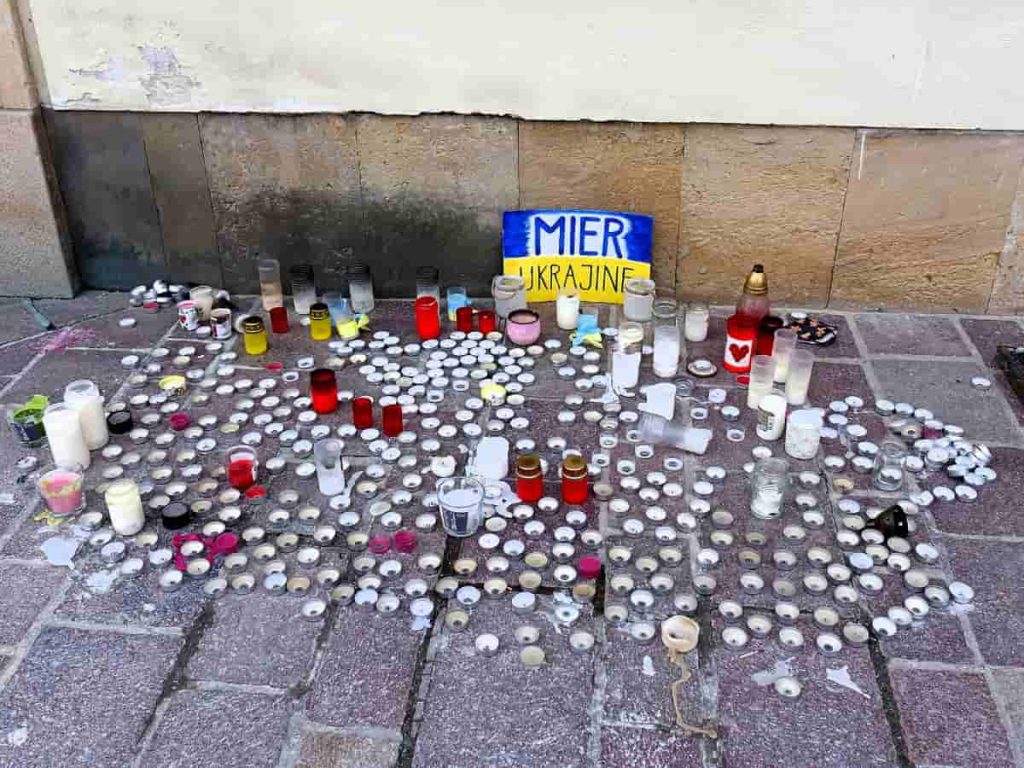
It’s been a few days since Romanians stopped wearing masks. Literally speaking, we have finally been told that such protection is no longer necessary, even though the hospitals are still full of sick people. The pandemic is not over, but a greater evil has appeared at the borders of our country, an evil we would hopefully never meet face to face: war.
Terrible as it sounds and can be felt in the images broadcast 24 hours a day on all the TV stations, the war in the neighbouring country has produced an unprecedented, totally unexpected outcome: Romanians stopped wearing masks in their daily lives and started showing their true colours.
Most of us started showing kindness, courage, devotion to a cause- helping the Ukrainian refugees with everything that is possible, from food and clothes to shelter. Many people drove to the borders with trucks full of blankets, diapers for babies, boots and scarves, anything they might need. Volunteers stood there night and day to offer the refugees a cup of hot tea after a long wait in the dreary cold winter, a warm embrace and words that needn’t be understood, only felt. Interpreters were ready to help with translations and advice. Kids received a new toy and chocolate that brought a smile to their faces as the best reward. Many people have shared their homes with total strangers, people with whom they can only communicate in sign language. But what need is there for a common language when humanity is all that matters?
School children have donated books and crayons to their less fortunate siblings. They gave shelter to the pets those children couldn’t leave behind. They wrote short letters that other volunteers translated into Ukrainian so as to convey their feelings of brotherhood to those whose lives were shattered. They warmly received them into their schools.
What have we learnt? There are so many good people among us whom we have never known. There are deep sentiments we haven’t been aware of inside each of us, springing out, making us show our true soul. There are people able to lend a helping hand in spite of not having much themselves. There can be friendship beyond nationalities and different languages. In the darkest times, humanity will prevail.
“Technically it shouldn’t be NATO, it should be the United Nations”: The Poetry of Appeasement
By Adrian Liberto
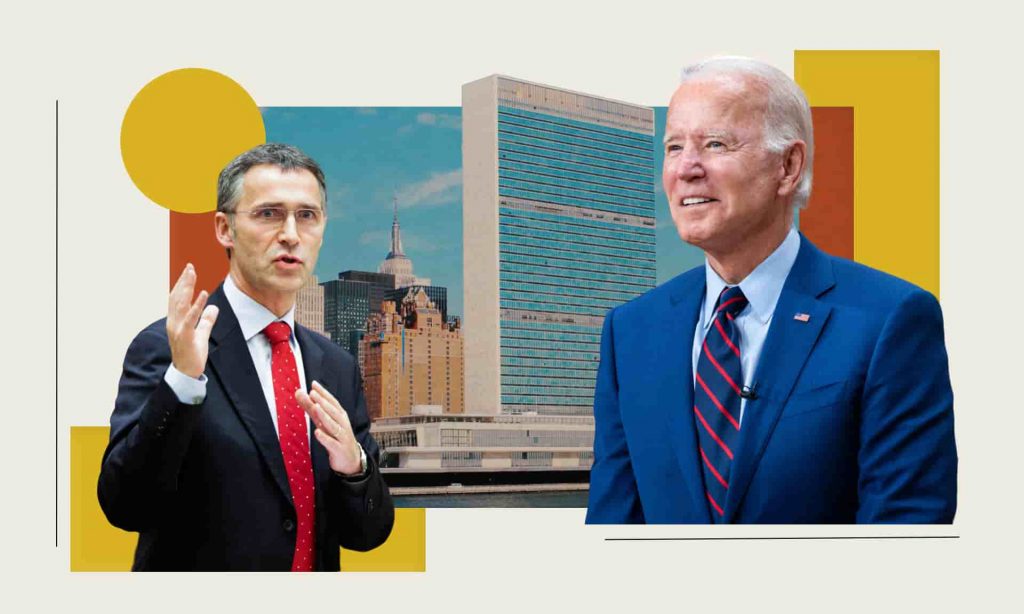
Has NATO been more successful with maintaining international peace and security? Photo by the UN-aligned design team.
Once again, the UN fails to secure its primary mission of safeguarding world peace. But what can we do about it?
We the people
As the list of governments I hate grows longer by the day, I cannot help but wonder about all the people who elected them into power in the first place. True, sometimes the system is rigged against the people, either because of the iron grip of despotic regimes or through a flawed system that only provides an illusion of choice. What Julius Nyerere said about America, applies to many democracies: “The United States is also a one-party state but, with typical American extravagance, they have two of them.”
Even in countries that do have more representative governments, parties are often forced to compromise their way into governing coalitions, watering down most of what they stood for in the process. Nevertheless, most of these governments are not without the support of the majority of their populations, be it in autocracies like Russia and China or traditional democracies like Brazil or India.
See no evil, hear no call to arms
The problem is not that people believe lies, but rather that they are not interested in finding out the truth. You see the truth demands action. If I deliberately push someone into a raging river in order to kill them, I am a murderer; but if they fall in or are pushed in by someone else, then I am not. I am not, that is, as long as saving them was not in my power. If I could have saved them without jeopardising my own life, but choose not to, say because I do not want to get my clothes wet or be late for work, then clearly, I too am a murderer; a murderer of a different sort, granted, but a murderer nonetheless.
Some people, say Putin for example, are comfortable being murderers, however, most of us are not. At the same time, we do not want to get our clothes wet. So what do we do?
Easy! Keep wearing those blinkers. It is no surprise, then, that when it comes to voting, we vote for people like us, or worse still, for those who quite enjoy pushing people to their deaths. The tragedy is that, despite living in this scenario, we delude ourselves that we are honest and upright citizens. Hell is empty and all the devils are here.
“And the stately ships go on to their haven under the hill…” They are carrying Russian and Saudi oil, Jaffa oranges, live sheep, fine milk and the dead calves for whom it was meant for, Hell’s “embroidered cloths, enwrought with golden and silver light” and perhaps some poor souls without papers fleeing some wartorn country to which they will soon be sent back to (but not before having to face every humiliation civilised society can throw at them). So we rush to buy our wares. Aye, we “may have heard the splash, the forsaken cry”, but for us “it was not an important failure”.
We are not powerless
True, the chances are that if you are reading this, I am preaching to the converted. Yet the question still remains: are we doing enough? Or do we watch in horror as “ignorant armies clash by night”, feeling totally powerless? Take Putin again. On the one hand you have this maniac unleashing an orgy of murder and destruction, on the other western politicians grovelling to make amends for Biden’s frank assessment of his crimes.
No, no, we do not propose regime change, do carry on… Oh dear, you should never have been called a butcher!
Do forgive us if your feelings have been hurt.” And: “Oh, we will ‘stare as long as sheep and cows’ on the condition that your slaughter does not cross this line. The people on that side are not wearing a ‘I’m a NATO member badge’.” It is all quite surreal. Putin seems to be saying: “Look on my Works, ye Mighty, and despair!” But we must not, neither at his barbarous work, nor at the limp response from those who should be protecting Ukraine. Yes, NATO, by default, but technically it should not be NATO, it should be the United Nations. That is what it was founded for; this is what it receives billions of dollars for: WORLD PEACE.
UN-aligned is trying to do its part, but we cannot do it alone. Our message for a better United Nations and a fairer world needs to be broadcast. We need to rock the boat. We will be there to help you with your pet causes, but be there for us too.
Help us by introducing new members, identifying campaigns, writing, joining our management team, sharing your ideas, assisting us in finding sponsors and funding streams… even a bit of moral support, sometimes! I will be honest with you: at the moment the weight of the organisation is on the shoulders of a few dedicated people, but as the organisation grows, so should the support it receives, otherwise the risk is that it will buckle. Please help!
Letter to Putin: “You are just a serial killer, but there is one thing I must thank you for…”
By Adrian Liberto
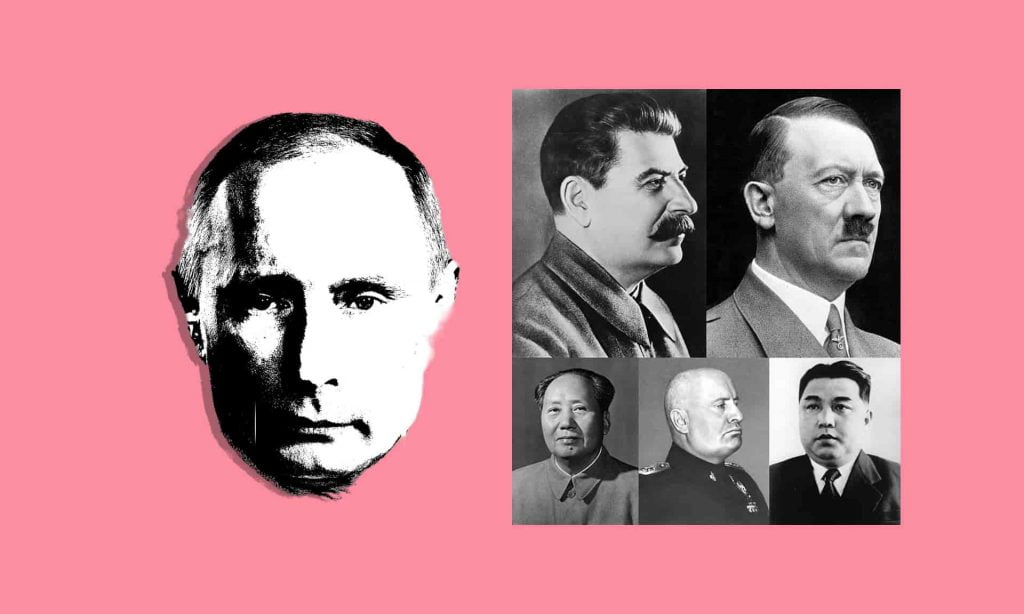
Putin and other dictators. Photo by the UN-aligned design team.
Putin,
I do not mean to be rude by not gracing your name with a salutation or title; quite the contrary; if I had done so, only obscenities would have been appropriate under the circumstances.
The situation I am referring to is, of course, your ever-increasing list of crimes: yours, plus the many your soldiers are sanctioned to carry out in your name, such as murdering innocent men, women and children, rape and pillaging. “Kill one man, and you are a murderer. Kill millions of men, and you are a conqueror. Kill them all, and you are a god.” I see that a god is what you are aspiring to become; a sinister god of the underworld, no doubt, but don’t delude yourself! Jean Rostand was referring to the perception in the minds of fools. You are no god. You are just a serial killer, a rapist, a bully and a thief. You will join the ranks of other sadists, who like you, abused their power to bring death and destruction into the world. However, in some ways you are worse than they are. They operated in darker times, when Truth was still struggling to climb out of her well. You have not got the luxury of mitigating circumstances. Truth is easily accessible now. The fanaticism of the past had been shown up for what it is, but you embrace it and with cynical irony you justify your onslaught on Ukraine as a Nazi-clensing operation, when in fact, it is your evil that is the closest thing to Nazism the world has known since Hitler’s demise.
But you know this. Why else would you keep your people in the dark? What are you trying to hide, if not the truth? Or is it that you believe they are too naive to understand? There is nothing difficult to understand. Facts speak for themselves. Your legacy is one of death and destruction, from your political opponents, to countries like Syria, Georgia and Ukraine. You target people, livelihoods, buildings and infrastructure. As for your own people, all you are trying to bequeath to them is a cloud of ignorance and intolerance. Be warned, however, each tear that has been shed because of you is a curse that will come back to haunt you. You will be hounded by the Furies and they will not rest until you have paid all your dues to justice.
So, NATO is your other great excuse. If you really were worried about NATO, you would not be provoking it now, even threatening it with nuclear war. Indeed, your excuses never did make any sense, no matter how hard you try to align them to your distorted reality. Still, you like to play the victim as well as the hero. And wasn’t Biden brutal when he called you a butcher? Your poor feelings must have been so hurt, though I understand not as much as when he said you should go. Yes, sometimes the West is as crazy as you are, but not for saying you should be removed, but for trying to mitigate the blow. It would be outrageous if you stayed. All agree that you are a war criminal, so who in their right mind would not want to see you behind bars?
Still, there is one thing I must thank you for. You have shown the United Nations up for what it is. True, its fiascos have been many, but such blatant abuse by a permanent member of the Security Council has really hammered home just how compromised it is. So something good may come out of all this: a new world order where criminals, even if they are heads of state, will be promptly arrested and put in prison where they belong.
What does it mean to be a Syrian refugee?
By Jihane Al-assad
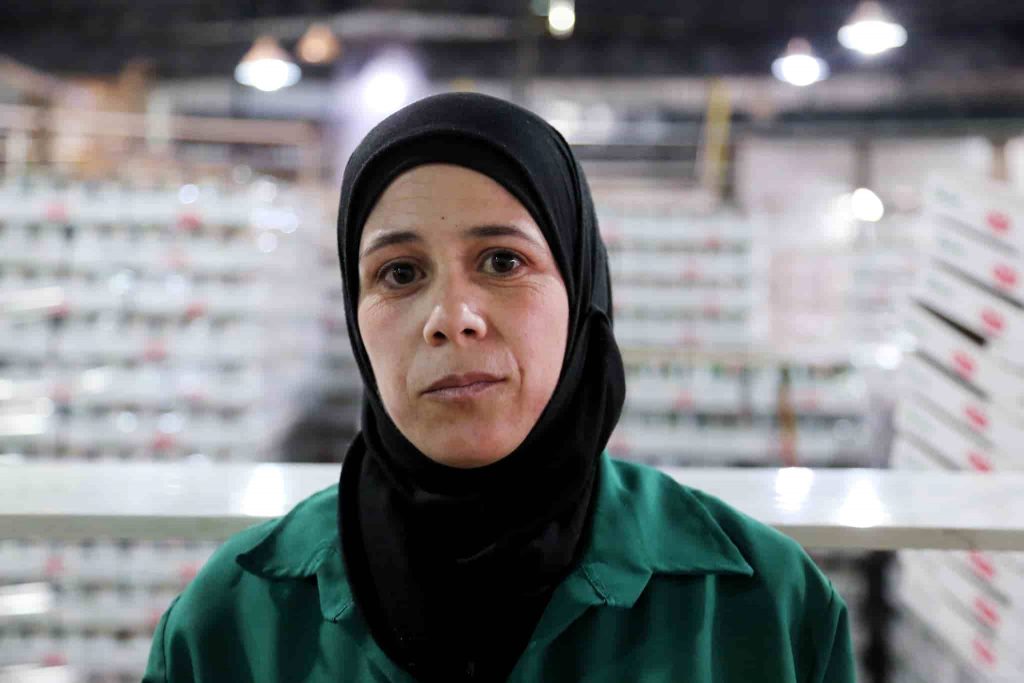
Photo: UK Department for International Development/Flickr
Arabs say, “Who lives with a people for 40 days has become one of them.” How is it, then, that we have lived here for so many years now and are still living half-lives?
I am Syrian; I think this phrase is enough to indicate that I may be in Sweden, Germany, Egypt or one of the many countries Syrians have resorted to in order to survive the tragedy inside Syria. This tragedy has left Syrians under the rubble, submerged in the Mediterranean Sea as they try to cross into Europe, or languishing in a prison under interrogation; perhaps eviscerated or eviscerating themselves.
I Am A Syrian Refugee Who Lives In Lebanon
This cruel place that has hurt me and I feel the bitterness of asylum thousands of times. Every moment it reminds me that I do not deserve to live like the rest of my peers in other parts of the world.
Nowadays, Syrians have become one of the many groups who flocked to UNHCR sites and other refugee support organisations. Asylum involves many tragic feelings, as well as fond memories of better times. To be a refugee means to carry a lot of feelings locked inside your chest; feelings for the times that have gone and you have had to give up for these lingering days. Memories of family reunions and the beautiful sessions with father, mother, grandfather, grandmother and the whole family come pouring back, especially on the feast days.
The Eid al-Fitr, the Eid al-Adha and Ramadan, the month of good things… they come to you with every lover, relative and companion. Then you wake up to find yourself alone; no one is holding you together. When Eid comes, you do not wake up early; because you don’t want to have to face the reality that no one will be coming to visit you; there is no one to dress up specially for. You are in a country where you know no one; where everyone is preoccupied with their relatives and loved ones, while you are alone: a refugee. Even though people are around you, everything is strange.
Being a refugee means that you feel like a second-class citizen all the time, after a country’s first-class citizens. They have more, or at least they have a certain stability; and you are always afraid of upsetting them. The first-class citizens have rights. They can get positions with government departments, as teachers, as engineers… They can have unions and other benefits. The refugee has to be grateful for menial jobs and often have to work in secret.
To be a refugee means to live with new cultures and new customs. Arabs say, “Who lives with a people for 40 days has become one of them.” How is it, then, that we have lived here for so many years now and are still living half-lives?
Being a refugee means being in a camp where children die from the cold. There is no roof to protect you; there is no flooring to protect you; there is not enough cover around you to shelter you from the cold nights and bad weather. We wait daily for European and Arab aid: medicines and other essentials.
In the end, being a refugee is being a story in itself. It may appeal to many, to write about one’s own tragedy and dismay. Just as the story of Spartacus, which told of the plight of slaves in the Roman Empire and their attempt to gain freedom from the oppression of masters; or Victor Hugo’s Les Misérables, or many novels which portray the injustice faced by the refugees, the missing, the oppressed, the bruised and the wounded. Such stories may capture the attention of filmmakers to make a new film on your ruins and on the shreds of your bones. A novel, or series, has an aspect of reality and truth that motivates the human imagination to create, produce and write, but we are more than just a story.
- Diaries from Refugee Camps is a Gordian Magazine series that gives readers a glimpse inside the challenging life of refugees around the world. Are you a refugee and would like to share your story? Please write to us.
LGBTQIA+ Youth India needs your help
LGBTQIA+ YOUTH INDIA reached out to UN-aligned because it is looking for volunteers, especially qualified councillors who can dedicate some time to its helpline. Please have a look at what the organisation does and see if you can help.
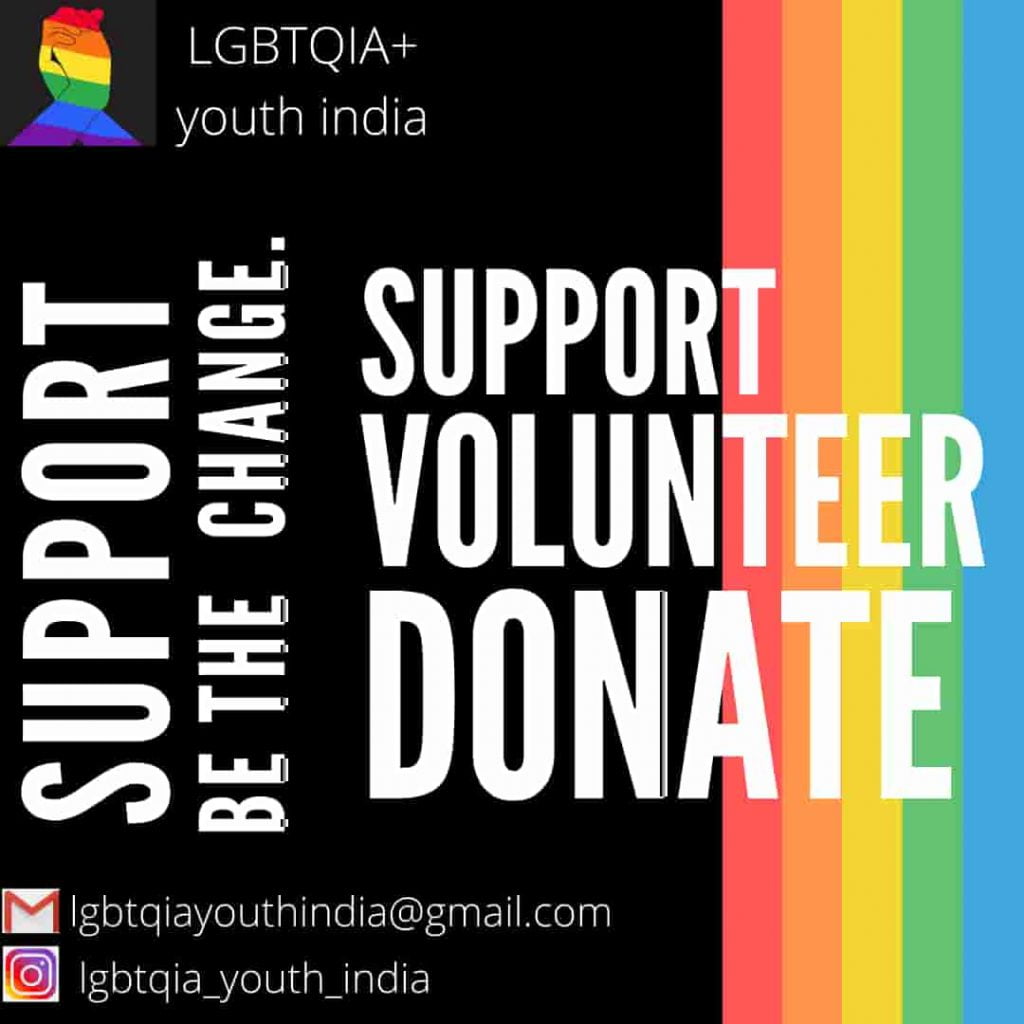
LGBTQIA+ Youth India was founded to tackle emotional distress faced by LGBTQIA+ youth who are severely bullied by their peers and society on grounds of sexuality.
Our community Helpline is an innovative service with a reliable team of counselors who are available 24/7 to provide professional advice and counseling over the phone or on a one-on-one basis, for free. We also have groups and forums to facilitate interaction and blogs to share interesting facts and information about the LGBTQIA+ community. These resources help spread awareness and bring about change.
We conduct events that bring support to the cause and celebrate the community. We also reach out to schools to educate students and parents about LGBTQIA+ in order to reduce homophobic bullying, improve the health of LGBTQIA people, and decrease the onset of problems common in LGBTQIA students, such as depression and low self-esteem.
Bullying and discrimination needs to stop… Society needs to understand and accept the LGBTQIA+ community. So, let’s step forward and, if necessary, change our perspectives to bring about this change.
Like Rings in The Water: Dante’s impact on Michelangelo
By Carla Pietrobattista
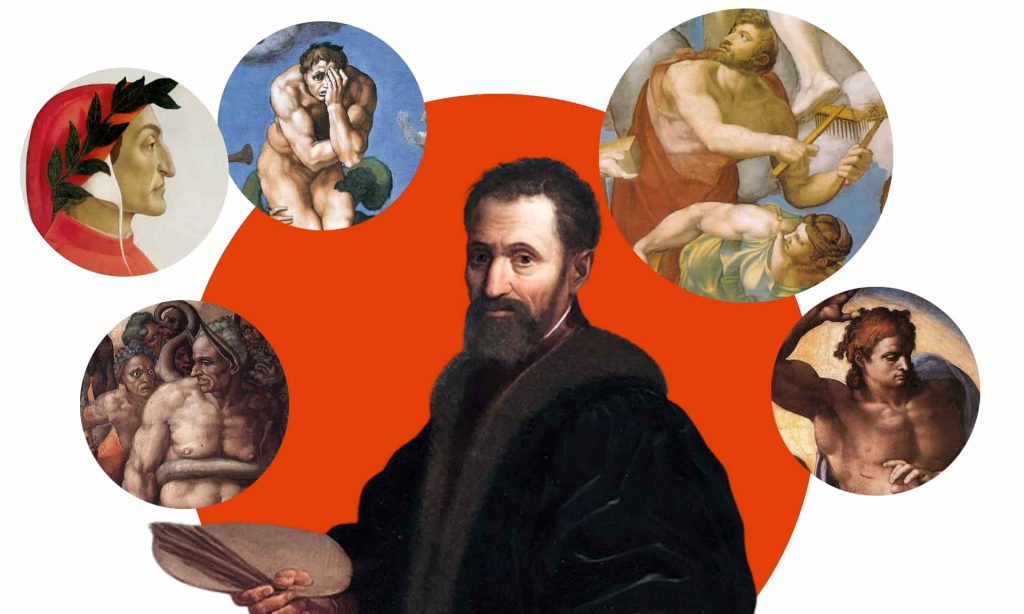
Photo by the UN-aligned design team.
The divine complexity of Dante’s Commedia has not only produced sterile admiration but has been able to generate new art in all the shapes and forms. This piece looks at Dante’s impact on the Michelangelo.
When a stone is thrown into the water, the greater the power of the blow, the greater the number of circles produced on the surface. The image of these circles that indicate the passage of the stone in the water, is the symbol that most represents the power of art. In fact, creating a work of art means launching a message whose strength, just like that of a stone, cannot be confined to falling silently into the consciousness of the recipients of the art itself; the impact must generate waves.
Dante’s lasting impact
The divine complexity of Dante’s ‘Commedia’, no doubt fits In this discourse of power and resonance. It has not only produced sterile admiration but, as only a great masterpiece can do, it has been able to generate new art in the spectrum of all the languages of art.
He has given us new words, daring constructive choices, new images and new solicitations in the souls of those who, although not knowing how to express themselves through the languages of art, still manage to imagine new and different worlds within themselves. The list of those who have continued to make Dante live through their works has many names and has increased over the centuries.
This is a testimony to how the work as well as the man can survive their natural and inevitable temporal limits thanks to the very essence of art that makes true beauty, and those who have been able to express it, eternal.
Dante’s impact on Michelangelo
Rodin, Botticelli, Dalì and many others in their images and sculptures have given shape to Dante’s hell, but I find that no one has understood and brought its essence to life better than Michelangelo Buonarroti. What the former expressed in words was translated into images by the other, in what comes across as affinity between two similar souls. Two hundred and ten years of historical distance are cancelled by a unique interpretative closeness, the result not so much of the assimilation of a teaching between teacher and pupil, but rather clear testimony of a dialogue between minds and similar souls. A profound similarity that certainly originates from common factors.
First of all, Dante and Michelangelo’s training environment, albeit with different historical and social nuances, is the same. The political vivacity of Dante’s Florence resonates in the cultural vivacity and the intellectual dynamism of Medici Florence. This observation offers a complex discourse regarding these sublime minds, all the more so when we consider another common element, namely the temperament of the two artists.
Despite the apparent differences, I find that the coherence of ideals and style, as well as the confidence in expressing one’s abilities and talents, has produced the same fruits, despite all external elements such as the alternation of luck. Both would never have reached the perfection that characterises them if they had not been faithful to their feelings, displaying an integrity that has never made them bend to the will of others. They put themselves at the service of powerful patrons, but never by selling themselves. This is what allowed Dante first, then Michelangelo, to express themselves with authenticity and truth, giving shape only to their own vision and their own intimate and personal thoughts.
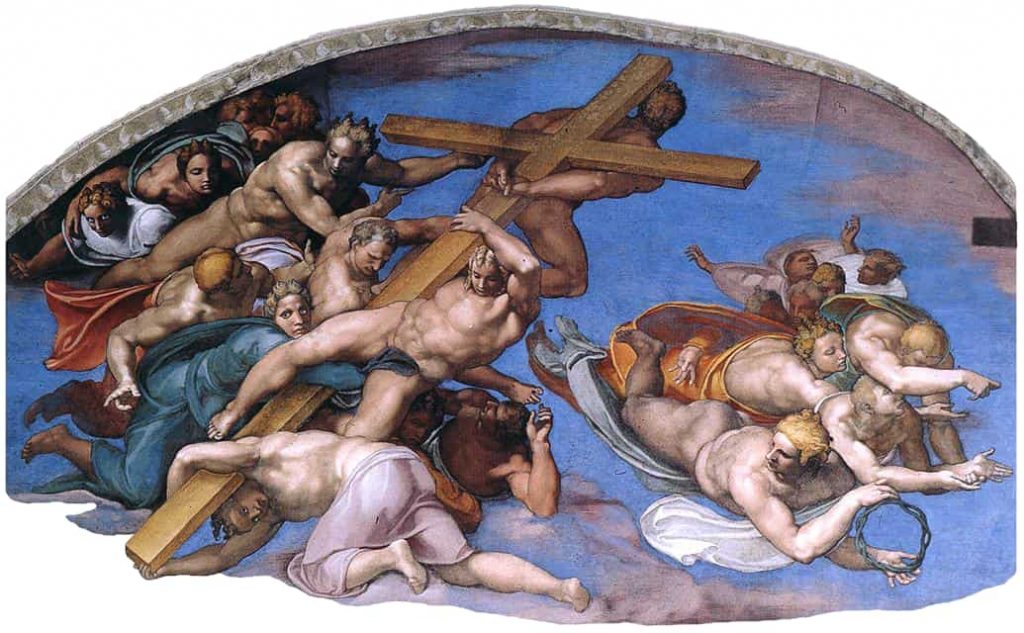
A scene from Michelangelo’s Last Judgment.
Another element that unites them does not come so much from the examination of their historical events, but from the stories they have told us. In fact, in both of their artistic productions they have done nothing but give shape to man in all of his facets. Man, understood as being aware of his most intimate nature and of all his actions. Man, whose beauty or poverty is exposed without filters, except those that the two have deliberately decided to put in order to facilitate their message for those who were able to grasp it. The cultural background of both was incredibly broad because it was free from self-imposed cultural limits. Nowadays culture is almost always limited to specific knowledge, purely curricular knowledge, aimed at building skills.
Dante and Michelangelo, on the other hand, have shown that they can move with fluidity and lightness through different fields of human knowledge such as ethics, philosophy, religion and anatomy.
Dante was able to play with words, giving them, through the use of rigid metric schemes, almost the same value and role of numbers in mathematical rules, without however making them prisoners of perfect form at the expense of substance. The same perfect form of Dante’s words is that of the characters in Michelangelo’s works where everybody, expression or pose does not stray from reality thanks to the artist’s careful study of painting techniques and human anatomy.
Just as Dante was able to describe the images with such intensity as to allow us to see them, so Michelangelo was able to translate his images, his drawings even, into words.
In fact, Buonarroti did not limit himself to expressing his feelings only through painting and sculpture, but also through the production of really interesting literary texts both in terms of form and content. This ability to express himself in different fields allowed Michelangelo to read Dante’s Divine Comedy with a deep awareness which, regardless of the considerations just made on closeness between the two, is certainly the element that most of all unites the two great artists.
Within his Commedia’s afterlife, Dante had given “form” to the damned, their sin, and their thoughts, while Michelangelo, with the same deep and intimate feeling, gave colour and expression to the Last Judgement. You don’t need to be particularly expert in literature, much less in art, to identify Dantesque elements within the scene of Michelangelo’s Last Judgement: Minos and Charon in fact immediately and easily evoke the association between the two.
If this were the only element of association between the two works, the allusion would have simply been limited to a clever reference by Michelangelo. However, the element that really makes the feelings of the two artists similar, if not even equal, can be found in the reading of each of the detailed expressions of the saints, the blessed and the damned.
In the Divine Comedy, Dante describes people and characters, outlining their story through their guilt or bliss. In both cases he highlights the awareness that accompanies every single character who experiences every single moment of eternity, unlike living beings on earth.
Time and eternity
Michelangelo presents the same awareness, but he tells it to us at a given moment, that is, the one that unites present and finite time with eternity. The novelty, the uniqueness of this moment gives the expressions of the subjects depicted not only the same Dantesque expressive awareness, but also the feeling of amazement that accompanies every change. In the lower part of the fresco, in fact, the amazement of the bodies that wake up from the sleep of death is opposed to the awareness of those who have been living the afterlife for some time. Michelangelo’s fresco makes visible the pain of the damned and the beatitude of the blessed, with the same dynamic liveliness of the journey through Dante’s three otherworldly realms. As the poet, who while moving between the various circles escapes from dangerous demons, so in the fresco the bodies just awakened from the sleep of death elude the grasp of the devils who try to grab them.
Just as the souls of Dante give testimony and motivation of their otherworldly destiny, so the blessed souls of Michelangelo exhibit, almost as proof, the instruments of their martyrdom and therefore of their salvation.
A dig at one’s enemies
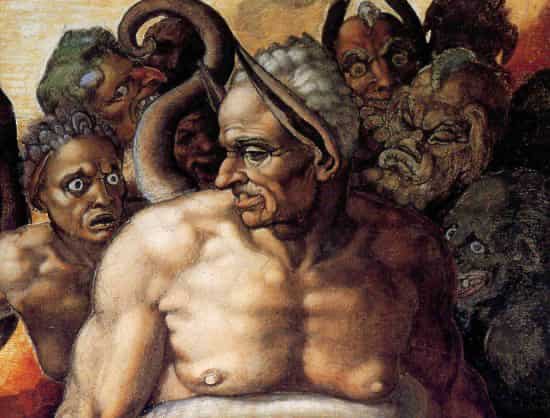
Minos was the son of Zeus and Europa. Every nine years, he made King Aegeus pick seven young boys and girls to be sent to be eaten by the Minotaur, a mythical creature who was part man and part bull.
In this discourse of similarities and parallels, the figure of Minos has always struck me, particularly because it contains a strong conceptual link between the two artists. It is known how Dante, out of a spirit of justice and personal revenge, reserved for his political enemies, who were responsible for his condemnation and therefore for his exile, a place in the afterlife among the spirits of the damned. Michelangelo also acted following the same instinct, choosing Biagio Martinelli as a “model” for Minos. The papal Master of Ceremonies, better known as Biagio da Cesena, had been called to express himself about the fresco that Michelangelo was painting and chose to label the painter “dishonest” for depicting naked bodies inside a sacred place. As Vasari recounts, Michelangelo did not tolerate this comment, above all due to the dubious conduct of the Master of Ceremonies, whose habits were anything but religious.
Both Dante and Michelangelo had complex personalities and a great awareness of their own value, yet both represented themselves in their works on tiptoe. Dante presents himself as a mere spectator of the divine will, Michelangelo as a skin without a body in the face of the greatness of what was happening. The two artists wanted to celebrate their thoughts and their inspiration more than their personal glory. In so doing, they have given us messages that after centuries continue to vibrate in the souls of those who know how to welcome them.
Poems for a better world: This War of MMXXII
By Usha Roopnarain
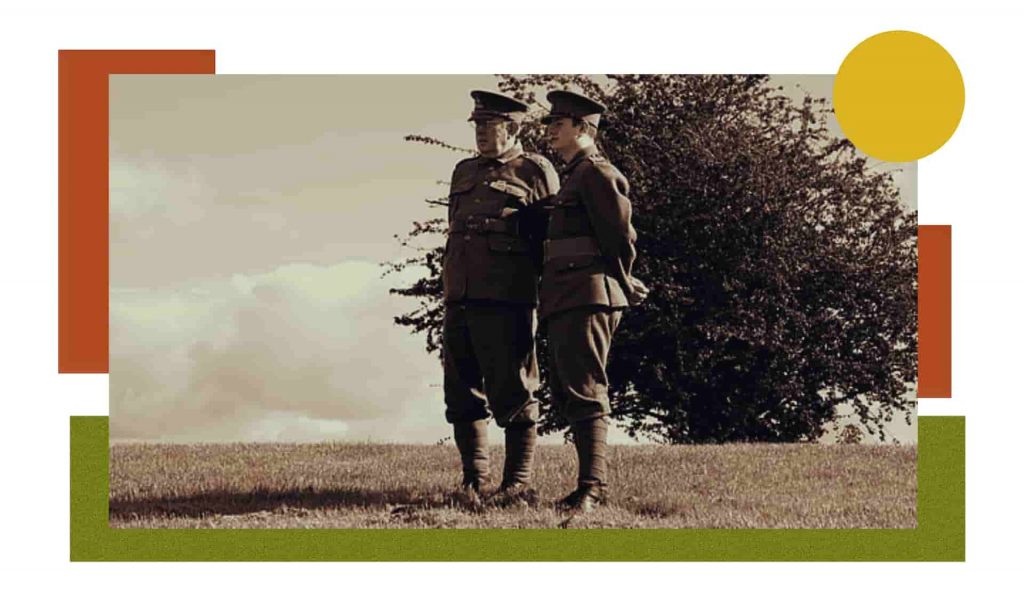
Photo by the UN-aligned design team.
This is war my dear!
Invasion for pure greed and gratification.
What else can this be?
Civilians, soldiers, casualties dying.
In their blood lying.
This is war my dear!
Lives are meaningless,
The soul is downcast and sighing.
This is the battlefield, blood, brutality.
Politicians lacking rationality.
Aggression, destruction, death and ravished.
Soldiers and innocent lying on the streets.
Surely logic has perished.
This is war my dear!
The cold carnage continues …
Unleashed on humanity.
Mourning for innocent lives.
Who will stop the insanity?
Can people not see such torment and tragedy?
This is war my dear!
There is only depravity and brutality…
- Dr. Usha Roopnarain is the former MP in the National Assembly RSA
“There are so many wonders in a cow’s head”: The Gordian Quiz
By Katha Wüstnienhaus

Photo by the UN-aligned design team.
Take this month’s Gordian quiz by clicking on the link below.
Portraits from Tanzania - In Pictures
By Anahita Ahmadi
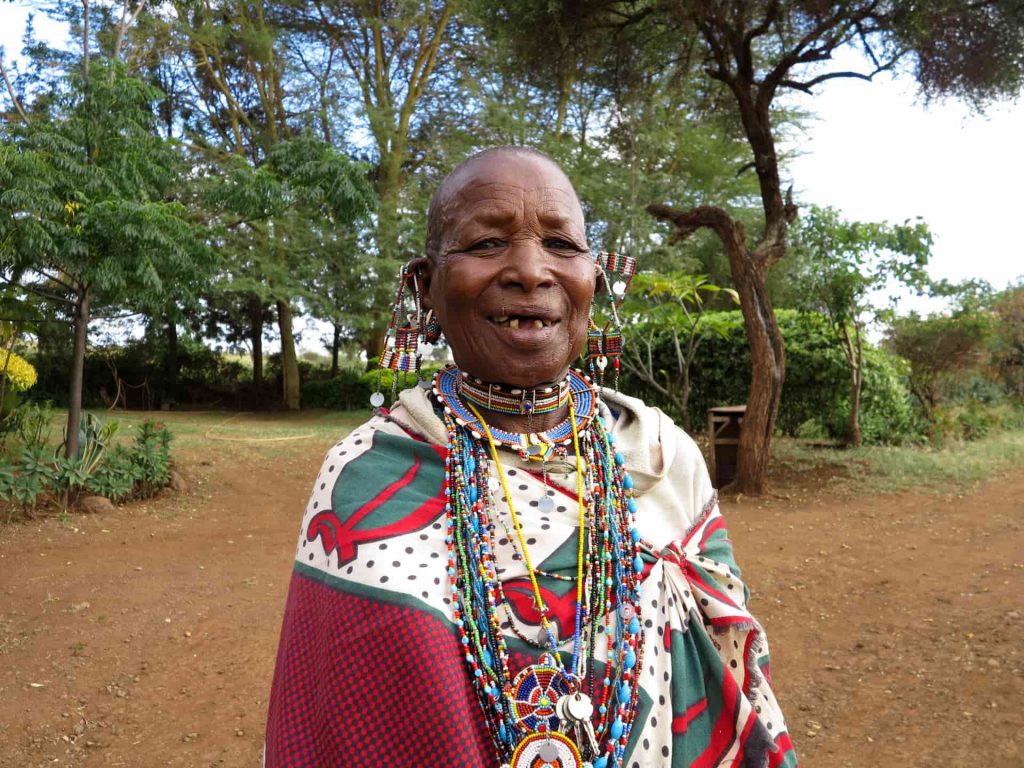
A Maasai woman - Tooth extraction amongst the Maasai people is a tradition practised in order to create space for feeding in the event of diseases that lock the jaw.
Anahita Ahmadi’s gallery consisting of portrait of Maasai people in Kenya.
What you may have missed in March 2022
By Adrian Liberto
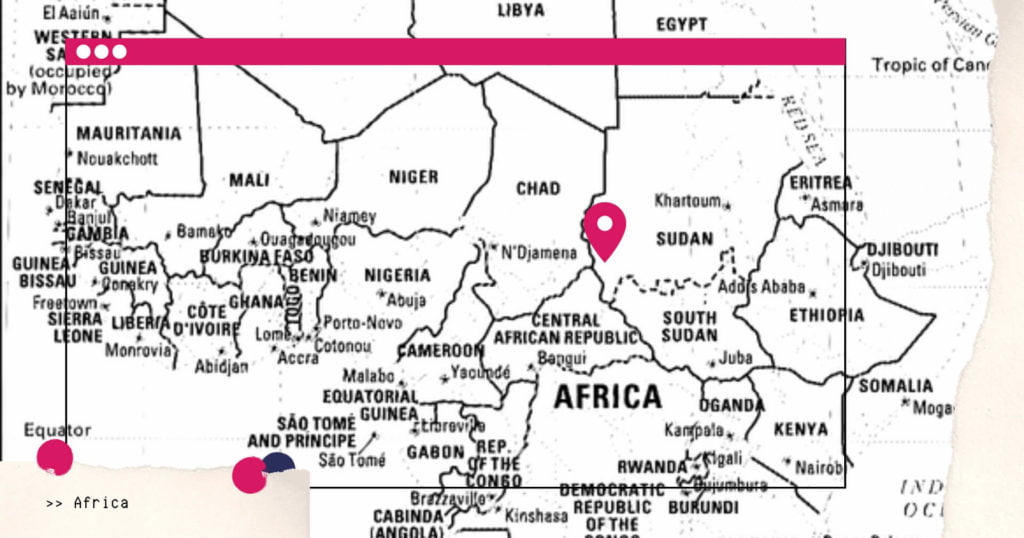
New reading made easy…
Quickly catch up with everything you may have missed last month.
That’s it from us. Thank you for reading The Gordian Magazine. ❤️


